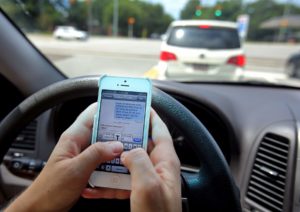 After years of wrangling, the Florida Legislature sent a stricter bill to Gov. DeSantis for signature. If Governor DeSantis signs the bill, it will take effect on July 1, 2019.
After years of wrangling, the Florida Legislature sent a stricter bill to Gov. DeSantis for signature. If Governor DeSantis signs the bill, it will take effect on July 1, 2019.
The bill affects Florida drivers in two significant ways: 1)texting while driving becomes a primary offense which means a police officer can stop a vehicle once the officer spots a driver using a mobile device to text, email or chat. Hands free use of a cell phone remains legal. 2)It more broadly bans any use of a handheld cell phone while operating a motor vehicle in a designated school crossing or school zone or a road work zone.
The penalties remain the same: a noncriminal traffic infraction that carries a $30 base fine plus court costs and fees for a first violation; a second violation within five years after that is considered a moving violation carrying a $60 base fine plus court costs and fees. Drivers caught texting will also be dinged 3 points against their licenses.
Texting at a stoplight or while a vehicle is stationary is not an offense. Emergency personnel are exempted, as are people reporting an emergency or criminal activity to police and those receiving messages related to the navigation or operation of their vehicle or safety-related information such as emergency traffic or weather alerts.
If the legislation becomes law, Florida joins 44 other states to make texting while driving a primary offense.
While most people approve of the new law, some law enforcement officers say that enforcement will be difficult. They are not allowed to seize the phone or device without a warrant.
AAA research shows people who text and driver are eight times more likely to be involved in a crash. The Florida Department of Highway Safety and Motor Vehicles reported more than 51,000 crashes involving distracted drivers statewide last year. The number of traffic fatalities in Florida has topped 3,000 each year since 2016, a statistic some law-enforcement officials say is due in part to distracted driving. Mark Jenkins, a spokesman for AAA, said: “When driving without seat belts became a primary violation, more people began wearing seat belts. We’re hoping as a result of this law, fewer drivers will text.”
